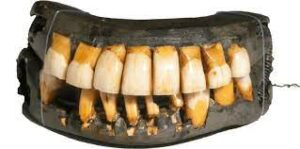Doctor Curmudgeon® Be Kind to Your Dentist & Remember George Washington’s Teeth Issues
By Diane Batshaw Eisman, M.D. FAAP Doctor Eisman is in Family Practice in Aventura, Florida with her partner, Dr. Eugene Eisman, an internist/cardiologist
On a quiet afternoon on the planet Earth on the continent of North America in a high school history classroom in Chicago, there dwelt a beloved teacher by the name of Arthur L. Weller.
He would often present us with quirky and little known tidbits of historical significance.
I have two precious cousins who are adorable and very rambunctious kittens. It had fallen upon me to take them to their veterinary dentist for cleanings. This had not been an easy task and was an exhausting experience.
Upon my return home, I collapsed into the nearest chair and mused about one of Mr. Weller’s historical tidbits about the teeth of George Washington. We were told that he had false teeth, some of which were ivory. Poor George had teeth that were horribly stained from wine and looked like wood. Sometimes they would lock, making it difficult to open or close his mouth.
President Washington was known for his physical strength, but his teeth were a mess.
By the time he was only twenty four years old, he had already had a tooth removed.
His personal diaries are replete with tales of poorly fitted dentures, teeth and gums that ached, and many payments to dentists.
Washington really tried to do everything that he could to help his teeth. He bought lots of toothbrushes and tooth scrapers and various cleaning solutions.
The very first dentist to make false teeth for him needs a place in history, because he had such a famous patient.
Dr. John Baker created a partial denture which was made of ivory and he used wire to attach it to the President’s remaining teeth.
Poor George did not want others to know of his dental suffering. It was a state secret.
He was horribly embarrassed when he learned that a communication he had written concerning his purchase of dental supplies had fallen into the hands of the British.
His private correspondence to his dentist gave instructions that tooth scrapers should be sent to him near New York as he had no plans to be in Philadelphia in the near future.
The commander of the North American British Forces was Sir Henry Clinton. This letter convinced Clinton that the packet was indeed genuine. And so, he felt confident that The Americans and their French allies would all be encamped outside of New York City and not be moving south to Yorktown where Lord Cornwallis had encamped his command.
In reality, planning had been in the works to move troops southward to box in Cornwallis at Yorktown.
This misled Clinton into believing there was no urgency in rushing to reinforce Cornwallis.
And thus, on October 19, 1781, the British were completely defeated at Yorktown. In a bizarre way, Washington’s horrific dental problems led to the last major land battle of the Revolutionary War. British General Charles Cornwallis surrendered to General George Washington.
From the Library of Congress: “On October 19, 1781, British General Charles Cornwallis surrendered his army of some 8,000 men to General George Washington at Yorktown, giving up any chance of winning the Revolutionary War.”
At the time of his inauguration in 1789, Washington had only one of his remaining teeth left .This surviving tooth was eventually pulled by Dr. John Greenwood in 1796. For his care, Dr. Greenwood was given the tooth and he had it put into a bit of glass that hung from his watch chain. A fitting memento for a dentist from his famous patient.
Near the end of his life, Washington was in Newburgh, New York when he wrote a letter to his cousin who was managing Mount Vernon:
“In a drawer in the Locker of the Desk which stands in my study you will find two small (fore) teeth; which I beg of you to wrap up carefully and send enclosed in your next letter to me. I am positive I left them there or in the secret drawer I the locker of the same desk.”
Dr. Curmudgeon suggests “Bitter Medicine”, Dr. Eugene Eisman’s story of his experiences–from the humorous to the intense—as a young army doctor serving in the Vietnam War.
Bitter Medicine by Eugene H. Eisman, M.D. –on Amazon
Doctor Curmudgeon® is Diane Batshaw Eisman, M.D., a physician-satirist. This column originally appeared on SERMO, the leading global social network for doctors.
SERMO www.sermo.com
Click Here to Order Boxing Interviews Of A Lifetime By “Bad” Brad Berkwitt


